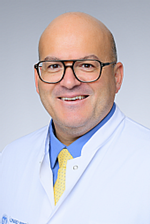Interview with Emmanouil Fokas, Chair of the ESTRO 2024 Clinical Track
PDF version
Which topics have received the largest number of abstracts?
The topics that have received the largest number of abstracts are breast, urological, and head and neck cancers.
Can you provide insights into the role of clinical research, especially the session on the latest clinical trials, in influencing and advancing radiation oncology practice?
The ESTRO congress committee has traditionally received outstanding high-quality abstracts that report important clinical trial findings, and ESTRO 2024 is not an exception. The session on the latest clinical trials provides comprehensive insights into the most recent trial findings across various tumour sites that have the potential to support adjustments in clinical practice. This session will cover diverse “hot off the press” topics, including but not limited to image-guided radiotherapy, stereotactic body radiotherapy for oligometastatic disease, immune-system-sparing radiotherapy and treatment-related toxicity. Participation in this session will ensure that you stay up-to-date and may inspire listeners to implement modifications in their standard patient care.
In your opinion, what are the emerging trends or research areas in clinical trials that attendees should pay attention to during ESTRO 2024?
I would rather consider these research areas as “increasingly expanding” instead of “emerging”. These cover topics of high clinical relevance such as hypofractionated and stereotactic radiotherapy, quality-of-life-centred treatment approaches to alleviate late toxicity, molecular classification and artificial intelligence (AI)-driven technology solutions. Finally, as the world’s population is ageing rapidly with an overall rise in rates of cancers that affect older adults, it is encouraging to see reports of clinical trials that have incorporated radiotherapy that is specifically focused on elderly patients with cancer.
What challenges and opportunities do you anticipate in translating the latest clinical insights discussed at ESTRO 2024 into routine patient care?
Translation of the latest clinical insights that will be discussed at ESTRO 2024 is poised to encounter a spectrum of challenges and opportunities that apply to the entirety of radiation oncology in the future. Challenges include the ongoing evolution of systemic therapy, especially immunotherapy, which introduces complexity into treatment planning and delivery; the increasing cost of cutting-edge radiotherapy technologies, which limits access to them in low-income populations; and the meaningful integration of the vast amounts of clinical, molecular and genetic patient data that are generated by various diagnostic modalities for personalised cancer therapy. An additional concern is the potential shortage of qualified radiation oncologists and related healthcare professionals, which could adversely impact the growing demand for cancer care globally. Nevertheless, with challenges new opportunities arise, and the outlook for radiation oncology is promising overall as our profession continues to play an unquestionable role in the multidisciplinary management of cancer. The continued advances in technology will be accelerated with the advent of AI, novel imaging modalities and big data, all of which can enhance the precision and effectiveness of radiotherapy while minimising side effects. Clinical trial collaboration on a global scale, and the integration of telemedicine and remote monitoring, can enhance patient access to care and accelerate dissemination of best radiotherapy practices. Last but not least, the continued efforts of ESTRO to deliver high-quality education and training for radiation oncologists, medical physicists, radiotherapy technologists and radiation biologists will continue to promote dissemination of science.
Can you share examples of sessions that will illustrate the intersection of radiation oncology with other medical fields, highlighting the multidisciplinary nature of the track?
The ESTRO 2024 congress will include several dedicated joint symposia. As such, it will provide a valuable platform on which professionals from different medical fields and disciplines can converge and exchange ideas and expertise on the latest research findings. Some important examples that show the multidisciplinary nature of the congress include the joint sessions of ESTRO with the European Organisation for the Research and Treatment of Cancer on clinical trial design for re-irradiation; with the European Association of Dermato-Oncology on the management of non-melanoma skin cancer; with the International Association for the Study of Lung Cancer on radiation dose escalation/de-escalation concepts in lung cancer; and with the European Association of Neuro-Oncology on therapeutic strategies for brain metastases. Further ESTRO joint symposia have emerged with the European Society of Radiology on liver ablation techniques, and with the Paediatric Radiation Oncology Society on the optimisation of radiotherapy approaches in paediatric cancer. We expect that these multidisciplinary joint symposia will promote the sharing of knowledge and foster the establishment of new collaborations.

Emmanouil Fokas
Department of Radiation Oncology
University of Cologne
Cologne, Germany